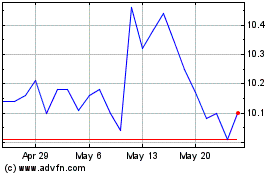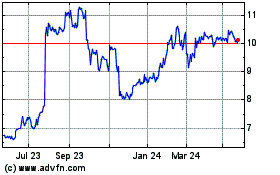U.K. Data Point to Economic Slowdown
21 April 2016 - 7:40PM
Dow Jones News
LONDON—U.K. retail sales fell in March, while Treasury chief
George Osborne missed a key borrowing goal, adding to signs the
economy slowed in the first quarter of 2016.
The data may intensify concerns that growth in the British
economy is easing off ahead of a referendum on membership of the
European Union scheduled for June.
The Office for National Statistics said Thursday that British
retail sales fell 1.3% in March compared with February, a much
larger fall than expected. Analysts polled by The Wall Street
Journal were expecting sales to be flat on the month.
The decline was felt across the sector, with sales falling at
clothing stores, food stores, department stores as well as through
mail-order and online outlets, the ONS said.
The figures are the latest in a series of disappointing data in
the U.K., coming after weak industrial production numbers and the
first rise in unemployment in almost a year. Thursday's retail
sales figures suggest that consumer spending, the engine of recent
economic growth, weakened in March amid subdued pay growth and a
gloomier economic outlook.
Among the clouds darkening the horizon: Uncertainty over the
outcome of a referendum on the U.K.'s EU membership scheduled for
June 23, which Bank of England officials say risks slowing the
economy by prompting consumers and businesses to delay
spending.
Proponents of exiting the bloc say that leaving the EU would
boost the economy by freeing businesses of burdensome regulation
and allowing the U.K. to focus trade on faster-growing parts of the
world.
Also Thursday, the ONS confirmed that George Osborne has missed
his borrowing goal for the 12 months through March, an early
setback in his latest five-year push to close the U.K.'s budget
deficit.
Data showed the government borrowed £ 74 billion ($106 billion)
over the fiscal year, £ 1.8 billion more than Britain's Office for
Budget Responsibility, the nation's fiscal watchdog, predicted.
Recent monthly borrowing figures had suggested the target was
likely to be missed.
The overshoot means Mr. Osborne will have to find fresh savings
in government spending, raise taxes or hope for faster growth in
the economy to meet his goal of balancing the government books by
2020.
Write to Jason Douglas at jason.douglas@wsj.com
(END) Dow Jones Newswires
April 21, 2016 05:25 ET (09:25 GMT)
Copyright (c) 2016 Dow Jones & Company, Inc.
Pacific Current (ASX:PAC)
Historical Stock Chart
From Apr 2024 to May 2024

Pacific Current (ASX:PAC)
Historical Stock Chart
From May 2023 to May 2024
